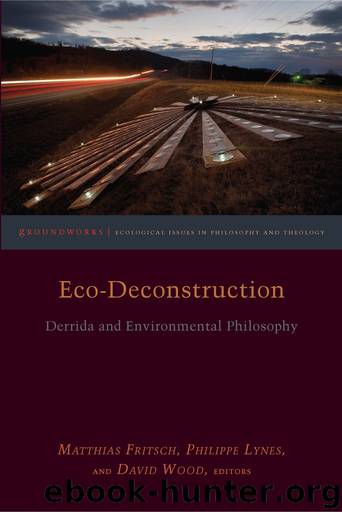Eco-Deconstruction by Matthias Fritsch Philippe Lynes David Wood

Author:Matthias Fritsch,Philippe Lynes,David Wood [Fritsch, Matthias]
Language: eng
Format: epub
ISBN: 9780823279500
Publisher: Fordham University Press
Published: 2018-01-15T07:00:00+00:00
PART III
Nuclear and Other Biodegradabilities
CHAPTER 8
E-Phemera: Of Deconstruction, Biodegradability, and Nuclear War
Michael Naas
/?ie=UTF8&keywords=biodegradable+sun+screen&tag=googhydr20&index7ymv2vzq10_ehttp://decorativeurns.com/urnmaterial/biodegradableurns?gclid=CL_8mR58QCFQcOaQodPIgAHAhttps://landing.honest.com/diapertrial?sid=10001&cid=google&mid=search&aid=Diapers%20%28Exact%29:Biodegradable%20%28t%2http://www.bpiworld.org/http://www.reverteplastics.com/?gclid=UTF8&keywords=biodegradeable+balloons&tag=googhydr0&index=aps&hvadid=3uw0d81suk_bhttp://www.greensafestore.com/?utm_campaign=Ecofriendly+Products&utm_source=google&utm_medium=ppc&utm_term=%2Bbiodegradable+%2Bbags&utm_content=1058377x66629688133?ie=UTF8&keywords=biodegradable+soap+bar&tag=googhydr20&index=aps&hvadid=70821257129&hvpos=1t3&hvexid=&hvnJACQUESDERRIDA/BIODEGRADABLES:SEVENDIARYFRAGMENTShttp://criticalinquiry.uchicago.edu/uploads/pdf/13436921.pdf:http://=1t2&jk=biodegradableconfetti&jkId=UTF8&keywords=biodegradable+k+cups&tag=googhydr20&index_ehttp://greenpaperproducts.com/biodegradabletrashbagskitchen101.aspx?gclid=CP_XhYOGunnkhttp://ecogolfballs.com/Gg/40707/greenbiodegradableplasticdinnerware.htmlhttp://www.webstaurantstore.com/2923/green-biodegradable-compostable-plastic-take-out-containers.html.
—Remains of a biodegradable word search
“Biodegradables”: it’s first of all a name, very googleable and attached to a whole range of industrial products available both online and in stores, everything from diapers and trash bags to balloons, confetti, and funeral urns. But it’s also the name or title of a 1989 article by Jacques Derrida, just one among hundreds of other Derrida articles, of course, but also one of just a handful of Derrida works with a legitimate claim to being absolutely central to anything that might fly under the banner of “Eco-Deconstruction.” For “Biodegradables” contains some of Derrida’s most explicit and developed reflections on ecology and the environment, as well as on the related questions of life, survival, waste, remains, and what will remain—or not—after the end.
And yet this work of 1989 has remained largely unread since its publication over a quarter of a century ago, running the risk of going the way of the very best of biodegradable products—the risk, that is, of decomposing to the point of becoming unrecognizable, unreadable, or at least unread, just part of the vast and ever-growing compost pile that circulates today under the general rubric of “Theory,” its distinctive voice all but drowned out by the incessant chatter or white noise of our contemporary archive, “like the sound of the sea deep within a shell.” If I feel compelled, therefore, to return here to this rarely read Derrida work—in the company, I am happy to note, of Michael Peterson’s superb contribution to this same volume—it is to try to do my part to help save it from loss, from forgetting, from all those processes that collect the daily debris of our scholarly lives and deposit it, with or without recycling, in some common landfill. It is to help save it so that it might help us today to rethink questions of biodegradability, remains, survival, life, and, perhaps especially, the relationship between ecology and war that is at the center of it, to help save it, then, so that we ourselves might become haunted and provoked by something buried deep within it, something that must not be forgotten today since it concerns nothing less than the whole of life itself.
To use a term that Derrida will at once use and comment on in this text, “Biodegradables” is a rather strange “artefact” in the Derridean corpus. It is a long piece (some sixty pages), and yet it is unknown to most readers of Derrida and rarely commented on even by those who know his work well.1 There are several good reasons for this. First, although this work was, like all of Derrida’s works, written in French, it has, to my knowledge, never been published in its original language. It is thus available today only in translation, indeed, again as far as I know, only in Peggy Kamuf’s English translation. Second, while the essay was published in an important and widely circulated journal,
Download
This site does not store any files on its server. We only index and link to content provided by other sites. Please contact the content providers to delete copyright contents if any and email us, we'll remove relevant links or contents immediately.
| Books & Reading | Comparative Literature |
| Criticism & Theory | Genres & Styles |
| Movements & Periods | Reference |
| Regional & Cultural | Women Authors |
4 3 2 1: A Novel by Paul Auster(12354)
The handmaid's tale by Margaret Atwood(7730)
Giovanni's Room by James Baldwin(7301)
Asking the Right Questions: A Guide to Critical Thinking by M. Neil Browne & Stuart M. Keeley(5741)
Big Magic: Creative Living Beyond Fear by Elizabeth Gilbert(5726)
Ego Is the Enemy by Ryan Holiday(5392)
The Body: A Guide for Occupants by Bill Bryson(5065)
On Writing A Memoir of the Craft by Stephen King(4920)
Ken Follett - World without end by Ken Follett(4706)
Adulting by Kelly Williams Brown(4552)
Bluets by Maggie Nelson(4534)
Eat That Frog! by Brian Tracy(4500)
Guilty Pleasures by Laurell K Hamilton(4425)
The Poetry of Pablo Neruda by Pablo Neruda(4079)
Alive: The Story of the Andes Survivors by Piers Paul Read(4010)
White Noise - A Novel by Don DeLillo(3990)
Fingerprints of the Gods by Graham Hancock(3979)
The Book of Joy by Dalai Lama(3961)
The Bookshop by Penelope Fitzgerald(3828)
